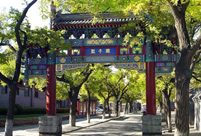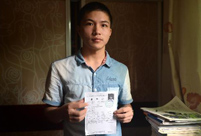 Post-90s beauty boxer grapples four men
Post-90s beauty boxer grapples four men
 3,000-year-old tea town through lenses
3,000-year-old tea town through lenses
 22 archaeological sites along Silk Road in China
22 archaeological sites along Silk Road in China
 Football babies, Samba dancers embrace 'World Cup'
Football babies, Samba dancers embrace 'World Cup'
 Beautiful scenery along China’s Grand Canal
Beautiful scenery along China’s Grand Canal
 High speed train attendants receive training in Chongqing
High speed train attendants receive training in Chongqing
 Rare rainbow clouds seen in Fujian
Rare rainbow clouds seen in Fujian
 Small bracelet going global
Small bracelet going global
 Aerial Photography: Amazing Tianshan Mountains
Aerial Photography: Amazing Tianshan Mountains
 'Animals' in 2014 World Cup
'Animals' in 2014 World Cup
SEOUL, July 3 -- South Korea and China agreed Thursday to launch a market for direct trading between currencies of the two countries, which may open in Seoul this year, to reduce foreign exchange costs and risks for companies and boost bilateral trade and investment, the South Korean presidential office said.
The launch was pursued by Seoul as it will meet national interests of South Korea to diversify settlement currency and respond to the Chinese currency's internationalization and enhanced stature, the office said in a statement.
Central banks of the two countries signed a memorandum of understanding (MOU) to designate clearing banks, with visiting Chinese President Xi Jinping and his South Korean counterpart Park Geun-hye in attendance.
Xi arrived here Thursday for a two-day state visit, his first trip to the Asian neighbor since he took office. The Chinese president held a summit with Park, his fifth summit meeting with her. Park paid a state visit to China in June last year.
Only Chinese lenders in Seoul will be appointed as clearing banks, capable of settling payments in the renminbi within South Korea. It will make daily yuan settlement possible, which has been done mainly in Hong Kong, in the country.
Under the Renminbi qualified foreign institutional investors ( RQFII), China granted 80 billion yuan (some 13 billion U.S. dollars) of quotas to South Korean financial institutions, allowing the institutions to make direct investment in the Chinese domestic financial market with yuan funds earned from the won-yuan direct trading market.
With these agreements, South Korea will establish the market where the yuan can be converted into the won first in Seoul. The two countries agreed to push for the establishment of the won-yuan transaction market in Beijing in a gradual manner according to the South Korean currency's internationalization.
South Korea also agreed to encourage local and foreign firms here to sell the yuan bonds within the country in a bid to boost financial transactions in the Chinese currency.
The series of agreement had a great meaning as a package of institutional base for ample supply and demand for the Chinese currency was completed rapidly and comprehensively through the summit meeting between Park and Xi, the presidential office said.
The base for active transactions between the two currencies will benefit companies of both countries and boost bilateral trade and investment.
South Korean companies will save conversion costs such as exchange commission by directly converting the yuan into the won, with no need to undergo a process of exchanging the renminbi for the U.S. dollar before swapping the U.S. dollar into the South Korean currency.
Settlement costs will reduce as South Korean companies can use Chinese clearing banks in Seoul, while Chinese firms will benefit from falling foreign exchange risks by settling trade with the renminbi.
It will also reduce South Korea's dependence on the U.S. dollar for settlement in trade with China. The two neighbors have used the U.S. dollar as the main settlement currency because the yuan and the won are not exchangeable fully in the global market.
The reduced costs were anticipated to further speed up bilateral trade, which has already reached a landmark level.
Two-way trade between China and South Korea totaled 274.25 billion U.S. dollars in 2013, amounting to South Korea's trade volume with the United States and Japan combined. It was a 55-fold expansion since the two nations set up diplomatic ties in 1992.
China has become South Korea's largest trading partner, largest market of exports, largest source of imports and biggest destination of overseas investment, while South Korea was China's third-biggest trading partner and fifth-largest source of foreign investment in 2013.
Seoul and Beijing set off negotiations for the bilateral free trade agreement (FTA) in May 2012. To date, 11 rounds of talks have been held.
 Featured hutongs in Beijing
Featured hutongs in Beijing Separate college entrance exam
Separate college entrance exam Flash mob dance
Flash mob dance Picturesque scenery of Ghost City
Picturesque scenery of Ghost City Children attend First Writing Ceremony
Children attend First Writing Ceremony Female master poses for graduation photos with son
Female master poses for graduation photos with son Silk Road, China's Grand Canal listed as World Heritage Sites
Silk Road, China's Grand Canal listed as World Heritage Sites PKU students imitate famous paintings in real-person photos
PKU students imitate famous paintings in real-person photos Chinese 'Slumdog Millionaire'
Chinese 'Slumdog Millionaire' Islands in S. China Sea better shown on new vertical atlas of China
Islands in S. China Sea better shown on new vertical atlas of China Girl takes father’s portrait to travel the world
Girl takes father’s portrait to travel the world Images of Xi'an: Part one
Images of Xi'an: Part one In Pictures: Female fans of World Cup
In Pictures: Female fans of World Cup Top 20 hottest women in the world in 2014
Top 20 hottest women in the world in 2014  China's top 10 representative architectures
China's top 10 representative architecturesDay|Week|Month